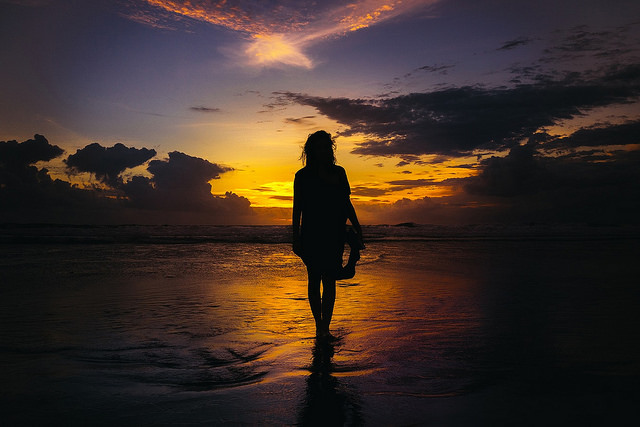My senior year in college, 7 friends and I drove a million miles to Miami to sail on a cruise boat for a week and it ended up being the capstone to my college experience. Beautiful islands, beautiful friendships, covered in laughter. On a favorite stop to St. Maartin, Cara, Angie & I decided we wanted to beach it. We taxied to a local beach and each rented a chair that came with a free drink. Then, the beer was cheaper than water – and we’re cheap. At one point, Cara needed to pee so she sauntered into the water to “cool down.”
Cara had brought along her video camera – please remember I graduated in 2003, before our phones were so fancy – so while she was, ahem, busy, I snagged the recorder from her bag. First, I just recorded her peeing in the ocean, which was nothing really to see.
Then, I noticed two older individuals walking the shoreline. She was wearing a belly chain around her navel (yes, like a necklace, but for your waist). That was all. He was also enjoying the benefits of the sunshine without the fear of tan lines.
So, of course, I added that to our footage.
Now, the ensuing inner conversation likely focused on how these individuals, who were much older, seemed to be the last people who *should* parade down a beach naked. Everything that our society says should be hidden – specifically wrinkles and rolls – was out on display. In my immaturity, I wondered, do they think they have better looking bodies than what I see? I had to wonder, why would they show off those parts of themselves?
That’s where my thinking went askew. I mistook freedom for pride.
Most of the folks utilizing the clothing-optional areas don’t do so because they’re showing off because, you see, they’re not at the beach for you, or me, or any other person lounging in the sun. They’re present for their own enjoyment. And how their bodies appear to the general public is not the cost of admission.
They have shed more than their tops; they’re rid of their shame. The opposite of shame isn’t pride or glorification. It’s freedom.
It’s freedom from the weight of the opinions of others. It’s freedom from the yoke of believing my body needs to look a particular way in order to be seen; as if this body serves anyone other than me, and my own well-being. (Ok, I’ll give you this: my body technically served my four children well for about 5 years as their first homes and sources of nutrition. But not once did any of them remark about how they ate better when I was, or was not, in a bikini.)
You see, here’s the thing I cannot wrap my mind around. Who came up with the idea that, no matter what size is listed on the inside of your jeans, that the world would be better with LESS of you in it? You are exquisite, the only one the world has. The world doesn’t need less of you. Not less of your waist, not less of your mind, not less of your work, not less of your ideas, not less of your emotion. And, if any of these things get in your way of a flourishing life, you get to decide what to do about that.

I’m not the first to be told I’m “too much.” Too much energy, too much effort, and even, I take up too much space. But these words were spoken because they knew the “not enough” lie wouldn’t stick; it wouldn’t have the same sting. So they took the same lie and flipped it upside down as an attempt to make me feel shame in my bigness: my aliveness.
But the opposite of shame is not pride or glorification. I don’t have to feel that what I am is the ideal; I only have to accept that what I am is enough. Not perfect, but good. The opposite of shame is freedom, living without the weight of expectations – or the fear of failing to meet those expectations.
Chances are slim I will saunter down a beach with less than a swimsuit – it’s just not my thing. More challenging to me will be speaking my voice when it dissents, asking questions others don’t believe belong in the conversation, and showing up when I don’t feel included. My willingness to be a person who doesn’t fit into the size expectations of society – pants size or energy size – is the work of freedom.
